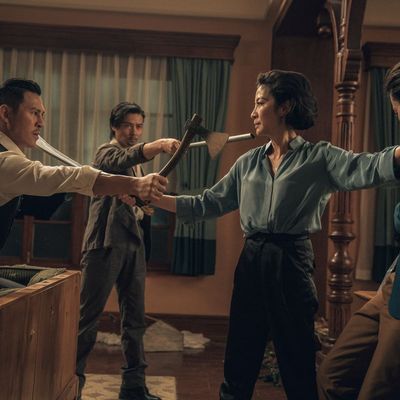
Though it hasn’t made much of a dent stateside, director Wilson Yip and star Donnie Yen’s Ip Man film series, a mythologized take on the real-life mid-century Wing Chun master who famously taught Bruce Lee, has proven to be one of the more successful Kung fu action franchises of the past decade, elegantly blending period melodrama with acrobatic fight sequences. Master Z: The Ip Man Legacy represents an attempt to expand that world, focusing on one of Ip Man’s adversaries from the third picture in the series. It’s unlikely to make new converts, but it’s filled with vibrant, graceful ass-kickery, and sometimes that’s all one wants, and needs.
Ip Man does not actually appear in this film, mind you, aside from a few brief flashbacks. The hero this time is Cheung Tin Chi (Max Zhang, who looks like he could snap your neck with his cheekbones alone), a fellow Wing Chun master who was defeated by Ip Man in the previous entry, and who has closed down his martial arts school and moved with his young son to Shanghai. After a brief period working for some gangsters, he decides to renounce fighting and open a small shop so he can steer clear of crime and violence.
Cheung’s refusal to fight isn’t exactly a refusal to fight, of course; he immediately pounces whenever someone powerless appears to be in trouble. And when he comes to the defense of Julia (Liu Yan) and her junkie friend Nana (Chrissie Chao) against a group of thugs led by local gangster Tso Sai Kit (Kevin Cheng), Cheung and his son are targeted for revenge. Meanwhile, Kit’s powerful sister Kwan (Michelle Yeoh), head of one of the city’s biggest crime families, is also looking to go legit, putting her in direct conflict with her brother, who wants to expand the local drug trade. And then there is Owen Davidson (Dave Bautista, bringing some of that international money), a seemingly respectable, steak-obsessed, high-end restaurateur who’s got some nasty secrets of his own. Casting a comically huge pro-wrestler with limited range as a supposedly calm businessman is a clever way to build suspense; we know this guy will eventually turn out to have some moves on him, and as a result the actor’s stony blankness gains a sense of simmering menace.
The plot of Master Z unfolds as a diffuse conflict between those looking to finally make an honest living and those who want to sink further into depravity and corruption. Even Nana, the former showgirl looking to get clean, becomes a pawn in this game. But the film could have done a bit more with this idea: It might have been interesting to really hold back on letting Cheung engage, waiting till the end to bust out the hero’s big moves. For what it’s worth, we do have to wait a while before Michelle Yeoh is fully unleashed, as she luxuriates in the role of cool, regretful mob boss before finally starting to kick in chests and slice off arms. (It’s pretty glorious when it finally happens.)
That said, restraint has never been the Ip Man films’ thing. They’re big, bold, boisterous spectacles, turbo-loaded throwbacks to the golden age of Hong Kong cinema. That means constantly shifting allegiances, and the idea of martial arts combat as a kind of moral currency. When good guys get together in these movies, the first thing they often do is kick the shit out of each other. Here, friendships are both forged and severed with a fight. I enjoyed the slight disorientation caused by never quite knowing who would battle whom in this film, and what it would all exactly mean.
The director this time around is himself a martial arts legend, and one of the figures responsible for the renaissance of Hong Kong action in the 1980s and ‘90s: Yuen Woo-Ping was already renowned for directing Jackie Chan’s Drunken Master, Jet Li’s Tai Chi Master and Donnie Yen’s Iron Monkey, before he gained international fame choreographing the martial arts sequences in The Matrix, Kill Bill, and Crouching Tiger, Hidden Dragon. With his name attached, you might expect a lot of grandiose wire-fu, but he doesn’t get too overzealous with it. He does retain an uncanny ability to come up with imaginative ways to stage fights. A melee set among the elevated neon signs of a bustling merchant district has a magical quality; the slightly artificial quality of the buildings makes it all feel that much more impressive, as if we’re watching a stage show. That edge of artifice runs throughout Master Z. The camera swirls around sets that look a little fake, and the combatants move more like dancers than genuinely enraged opponents. But this isn’t really that big a problem in this case. While Master Z never quite builds up the realism or urgency to fully involve us in its story, it’s got a real sense of spectacle. It knows we’re there to see some lush, creative beat-downs, and it delivers.





